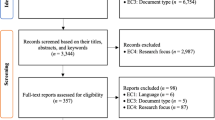Abstract
In recent years, much concern has been expressed about the quality of instruction provided by foreign teaching assistants (TAs) in higher education. Critiques of the use of foreign TAs generally argue that they often impede the learning process because of language barriers. The present study examines the effect that nonnative English-speaking TAs had on student performance over five semesters at the University of Wisconsin-Madison. Multiple ordinary least squares regression is used to analyze the relationship between student grades and nonnative English-speaking TAs. Subsamples based on a TA's geographic region of origin and instructional area are also analyzed. In addition, course drop rates and the impact of TA training programs are examined to determine possible influence on the results. The results of the analysis consistently indicate slightlybetter performance in sections conducted by nonnative English-speaking TAs.
Similar content being viewed by others
References
Draper, Norman, and Smith, Harry (1981).Applied Regression Analysis, second edition. New York: John Wiley & Sons.
Goldman, Roy D., and Slaughter, Robert E. (1976). Why college grade point average is difficult to predict.Journal of Educational Psychology 68:9–14.
Monaghan, Peter (1989). Universities deplore the lack of adequate training given to TAs, ponder how to improve it.Chronicle of Higher Education, November 29, pp. A17–A18.
Morawetz, David, et al. (1977). The use of graduate student instructors in the introductory economics course at the Hebrew University, 1967–1975.Journal of Economic Education, Fall pp. 47–50.
Oates, Wallace E., and Quandt, Richard E. (1970). The effectiveness of graduate students as teachers of the principles of economics.Journal of Economic Education, Spring, pp. 131–138.
Pindyck, Robert S., and Rubinfeld, Daniel L. (1976).Econometric Models and Economic Forecasts. New York: McGraw-Hill.
Saunders, Phillip (1971). More on the use of graduate student instructors in the introductory economics course.Journal of Economic Education, Fall, pp. 36–40.
Sykes, Charles J. (1988).Profscam: Professors and the Demise of Higher Education. New York: Regnery Gateway.
Tuckman, Howard P. (1975). Teacher effectiveness and student performance.Journal of Economic Education, Fall, pp. 34–41.
Watts, Michael, and Lynch, Gerald, J. (1989). The principles courses revisited.American Economic Review, May pp. 236–241.
Winkler, Donald R. (1975). Educational achievement and school peer composition.Journal of Human Resources 10 (2): 189–204.
Author information
Authors and Affiliations
Rights and permissions
About this article
Cite this article
Norris, T. Nonnative English-speaking teaching assistants and student performance. Res High Educ 32, 433–448 (1991). https://doi.org/10.1007/BF00992185
Received:
Issue Date:
DOI: https://doi.org/10.1007/BF00992185




